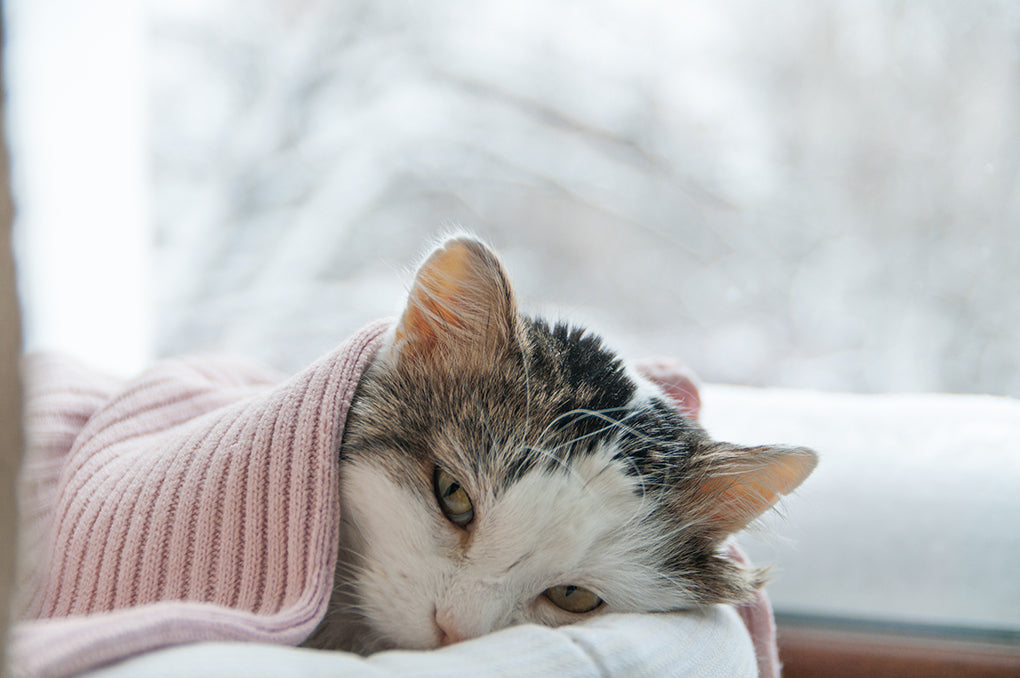
Lung Cancer in Cats: Life Expectancy, Causes, and Alternatives 2025
When their little companion becomes ill, for most pet owners it naturally becomes a major concern. If your cat is suffering from lung cancer, I can only imagine how difficult it must be to face such a diagnosis. You probably have many questions and concerns about your cat’s health.
In this article, we’ll explore in depth the symptoms, causes, traditional treatments, natural alternatives, and life expectancy of cats diagnosed with lung cancer.
At HomeoAnimo™, our team of experts passionate about animal health is here to provide you with the information and support you need during this difficult time. With over 20 years of experience in this field, we are committed to sharing our knowledge with you to help you navigate your pet’s diagnosis.
In our complete guide to cancer in cats, you’ll find additional information about the various types of cancer that affect cats.
What is lung cancer in cats?
Primary lung cancer in cats is a relatively rare condition. Unlike other species, it is uncommon for tumors to originate directly in a cat’s lungs. It is far more common to see lung tumors that are actually metastases—cancerous cells that have spread from a primary tumor located elsewhere in the body.
However, when a tumor does originate in the lungs (referred to as a primary tumor), nearly 80% of these masses are unfortunately malignant.
What are the causes and risk factors of lung cancer in cats?

It is often difficult to pinpoint a single, precise reason why a cat develops lung cancer. However, studies and observations have identified several risk factors:
- Age: Older cats are statistically more likely to develop this condition, as with many other types of cancer.
- Breed predisposition: Persian cats have shown a tendency to develop this type of cancer more frequently than other breeds.
- Cigarette smoke: Just like in humans, exposure to cigarette smoke (secondhand smoke) is a known risk factor for cats. Living in an environment where smoke is present significantly increases respiratory health risks.
- Environmental factors: Although less studied in cats, environmental elements such as exposure to pollutants or toxins may potentially play a role.
What are the symptoms of lung cancer in cats and when should you worry?

It’s crucial to know the signs of lung cancer in cats so you can determine when it’s time to consult a veterinarian. The symptoms can vary in intensity and are not always specific to this disease, which sometimes makes diagnosis challenging. Here are a few symptoms to watch closely:
- Difficulty breathing (dyspnea): This is one of the most common signs. The cat may breathe faster, with more effort, or have shallow breathing.
- Wheezing or persistent cough: A lingering dry cough, especially if it worsens, or wheezing sounds during breathing should raise concern.
- Reduced activity or lethargy: The cat may be less active, more tired, and may refuse to play or jump as usual.
- Unexplained weight loss: Significant, unexplained weight loss, even if appetite appears normal, is a warning sign of many conditions, including cancer.
- Loss of appetite: The cat may eat less or refuse food altogether.
- Behavioral changes: A cat that hides more, becomes irritable, or unusually affectionate may be expressing discomfort.
While not all of these symptoms necessarily indicate lung tumors, if you notice any of them, your cat should be examined by a veterinarian. As a general rule, the earlier a disease is diagnosed and treated, the better the chances of success.
It’s also important to note that not all cats show obvious symptoms when lung tumors are present, which is why regular veterinary checkups are key to monitoring your pet’s health.
What is the life expectancy of a cat with lung cancer?

The life expectancy of cats diagnosed with lung cancer depends greatly on the severity of the condition, the type of tumor, and how far it has spread at the time of diagnosis. Unfortunately, in cases of primary lung cancer, life expectancy is often less than one year.
More than half of cats diagnosed with primary lung cancer will develop metastases, meaning the cancer spreads to other parts of the body, which worsens the prognosis.
In advanced stages, this cancer often spreads to nearby lymph nodes, other areas of the lungs, and even other organs.
What are the conventional veterinary treatments for lung cancer in cats?

Dealing with your cat’s cancer diagnosis is never easy, and choosing the right treatment can be overwhelming. Your veterinarian may recommend traditional approaches:
- Surgery: If the tumor is localized, surgery is often the treatment of choice to remove the mass and, if possible, a margin of healthy tissue. This option offers the best prognosis if the tumor is small and has not metastasized.
- Chemotherapy: If surgery is not an option, if the cancer has spread (metastasis), or if the tumor type is chemo-sensitive, chemotherapy may be recommended to slow disease progression and improve quality of life.
- Radiotherapy: Less common for feline lung cancer, it may be used to shrink tumors or relieve pain in some cases.
- Palliative care: In cases of advanced cancer, the primary goal is to improve the animal’s comfort by managing pain, breathing difficulty, and other symptoms.
How can natural alternatives support your cat’s health while fighting lung cancer?

Many pet owners turn to natural alternatives to support their companions battling serious illnesses like lung cancer. These approaches do not replace conventional veterinary treatments, but they can work synergistically to strengthen the immune system, enhance comfort, and improve quality of life.
- Targeted nutritional support: A professional animal nutritionist may recommend specific dietary adjustments, supplements such as essential fatty acids (omega-3s with anti-inflammatory properties), antioxidants, or probiotics to support digestion and immunity. A balanced and nutrient-rich diet is fundamental for maintaining animal health during illness.
- Phytotherapy (Medicinal plants): Certain plants may be used for their specific properties under professional supervision. For example, adaptogenic herbs may help manage stress, or expectorant herbs may help ease coughing (with caution and always under veterinary advice).
- Homeopathy: Homeopathy may be considered as complementary support to stimulate the animal's self-healing mechanisms and manage certain symptoms or treatment side effects. It's essential to consult a homeopathic veterinarian for proper prescription.
- Stress management and environment: A calm, comfortable, and secure environment is vital. Reducing stress contributes to overall well-being and immune system support.
FAQ about Lung Cancer in Cats
Is my cat really "smoking" if exposed to cigarette smoke?
No, your cat doesn't smoke cigarettes, but it does inhale the smoke (this is called second-hand smoke). Cigarette smoke contains thousands of chemical substances, some of which are carcinogenic. When your cat breathes in this air, these substances settle on its fur and lungs, significantly increasing the risk of developing cancers, including lung cancer, as well as other respiratory issues.
Is lung cancer always fatal for cats?
The prognosis for lung cancer in cats is unfortunately often guarded, especially if the disease is diagnosed at an advanced stage or if metastases are present. However, "fatal" does not always mean an immediate outcome. With early diagnosis and appropriate treatment (surgery, chemotherapy, and natural support), it is possible to improve the animal's quality of life and, in some cases, extend its lifespan, even if full recovery is rare.
Are natural treatments enough to cure lung cancer?
It’s important to understand that natural alternatives, like those offered by HomeoAnimo, are complementary and not substitutes for conventional veterinary treatments (surgery, chemotherapy). They are intended to support the animal’s body, strengthen its immune system, improve comfort, and potentially reduce side effects from conventional therapies. Curing lung cancer usually requires a multidisciplinary approach involving veterinary care.
How can I tell if my cat is in pain due to lung cancer?
Signs of pain in cats can be subtle. Look for behavioral changes such as isolation, decreased appetite, difficulty moving, excessive or unusual meowing, excessive licking of a specific area, or a change in posture. Labored breathing can also be very uncomfortable. It is essential to discuss pain management with your veterinarian.
Can regular veterinary check-ups really detect lung cancer early?
Yes, absolutely. Although not all cats show visible symptoms early on, regular veterinary check-ups—including lung auscultation and sometimes routine chest X-rays (especially in older or at-risk cats)—can help detect abnormalities at an early stage. The earlier the diagnosis, the more treatment options are available and the better the prognosis.
Conclusion
Remember, we are always here to help and support you through your pet’s health challenges.
We would greatly appreciate it if you took a moment to share this article on social media, so others can also benefit from this important information! Don’t forget to leave us a comment telling us what health issues your pet is facing.
If you're worried that your pet may be suffering from a health issue, our Free Pet Health Recommendation can help. In addition to getting advice and recommendations from our Natural Health Advisors, they will also guide you through the products and treatment options that best suit your pet’s health needs.

























6 comments
Nous sommes désolés pour votre chat, nous avons, il me semble aussi discuté ensemble par appel à son sujet, donc nous venons de vous envoyer quelques conseils pour lui.
Homeoanimo
Bonjour mon chat persan de bientôt 14 ans vient d être diagnostiqué d une tumeur des poumons…Nous sommes dévastés car notre keke (son prenom) nous l avons trouvé à l âgé de 10ans dans un fossé dans un état déplorable nous lui avons apporté tous le bonheur possible et surtout remis sur pieds et là l horreur ..le veto l a mis sous dermipred, inhalation et comme les humains du fixotide mais très dur à lui donner…..voilà pouvez vous nous aider des conseils , peut être aussi des produits naturels pour le soulager???
Il mange moins peut être des conseils aussi de ce côté là
D ans l attente de vous lire
Cordialement l
Avenel
Bonjour Mme Rezgui,
Nous sommes heureux d’avoir eu l’opportunité d’échanger un peu avec vous dans les derniers jours et ainsi vous faire parvenir des conseils pour aider votre chat. Soyez assurés que si vous avez d’autres questions, nous restons à votre disposition. Merci !
Homeoanimo
Bonjour mon chat à une tumeur au pont le veto il dit il a 1 mois à vivre , il y’a pas une solution ?
Amel
Bonjour Remy.
Merci de nous contacter pour votre chat. Nous sommes désolés de ce qui lui arrive. Nous allons vous envoyer un email pour en savoir un peu plus sur sa santé actuelle.
HomeoAnimo.com
HomeoAnimo
Bonjour chat mâle de 13 ans castré tumeur au bronche volumineuse. Dans l’attente de votre retour
Remy
Leave a comment
This site is protected by hCaptcha and the hCaptcha Privacy Policy and Terms of Service apply.